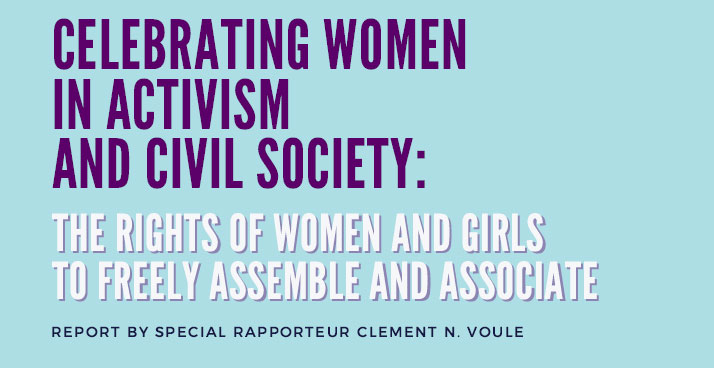
Oct 20, 2020
Women activists and their organizations are the drivers of positive change worldwide—and the freedom to form unions and freely associate is key to their ability to do so, according to a report released today.
“Celebrating Women in Civil Society and Activism,” prepared by Clément Voule, United Nations special rapporteur on the rights to freedom of peaceful assembly and of association, finds these fundamental freedoms empower women to “express their political opinions, engage in … economic and social activities … form and join trade unions and cooperatives, and elect leaders to represent their interests and hold them accountable.”
Yet women’s voices are undervalued, the report states, even as government, employers and others violate women’s rights, with many women experiencing an increase in severe violations of these fundamental freedoms and backlashes against gender equality. Exclusions from labor laws, barriers to forming and joining unions and reprisals for labor organizing leave women with “little leverage to change the conditions that entrench poverty, fuel inequality and limit democracy.”
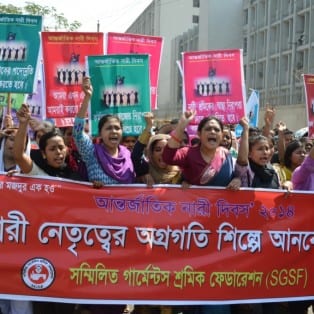
Women’s exclusion from labor laws and reprisals for forming unions in Bangladesh and around the world limit women’s ability to improve their workplaces. Credit: Solidarity Center
For instance in Bangladesh, “in many cases when garment workers want to unionize, they are blacklisted, intimidated, local groups threaten their families and many women are subject to physical assault,” says Nazma Akter, Awaj executive director and president of the Sommilito Garments Sramik Federation (SGSF). “There is no robust legal mechanism to appeal to for the right to organize and to help protect our human rights.”
Women seeking to improve their working conditions face similar challenges around the world, including in Ghana, where women “often are threatened with dismissals or non-renewal of contracts,” say Edward Kareweh, general secretary of the General Agricultural Workers’ Union (GAWU) and GAWU Gender Equality Officer Bashiratu Kamal. “There is a lack of cooperation from government in enforcing laws against discrimination, marginalization and exploitation.”
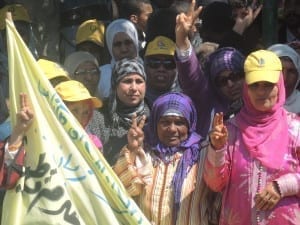
Agricultural workers in Morocco and around the world often are not covered by their countries’ labor laws, a lack of rights that falls especially hard on women. Credit: Solidarity Center/Hind Cherrouk
Laws barring retaliation against women who seek to form unions often are not enforced and additional barriers erected, say women activists.
In El Salvador, “the ability to form and join unions is a constitutional right, but in practice, there are many obstacles, ranging from delay in legal registration, defamatory campaigns, loss of employment, widespread violence, to murder in certain cases, says Marta Zaldaña, Secretary General of the union federation FEASIES.
“Tunisia’s Constitution guarantees equality and equal opportunities for men and women. But despite those important laws, the actual problem is in implementing those laws, especially in the interior regions where male domination prevails,” according to a Tunisian woman union activist.
Nazma, Kareweh, Kamal, Zaldaña and the Tunisian activist were among hundreds of worker rights and human rights activists whose testimony informed the report, which Voule is presenting this week to the UN General Assembly. SGSF, GAWU and FEASIES are Solidarity Center partners.
Gender-Based Violence the ‘Fiercest Form of Reprisal’
The ability of women to freely take action is especially critical now, as the COVID-19 pandemic has worsened the inequalities facing women, in their jobs, homes and communities.
“Faced with narrowing civic space, mounting inequalities and rising fundamentalisms, women have persisted in their fight for structural change, speaking truth to power and building resilience in their communities,” the report states.
Gender-based violence and harassment is “perhaps the fiercest form of reprisal to the exercise of the rights to freedom of peaceful assembly and of association for women workers,” the Special Rapporteur finds.
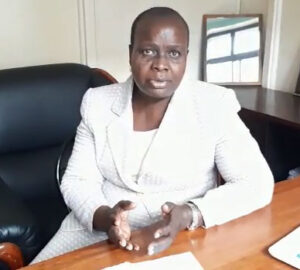
Violence is used as a way of discouraging women from actively participating in unions and seeking leadership positions—Rose Omamo, Metal Workers Union, Kenya. Credit: Solidarity Center
“Gender-based violence against women at work has been on the rise in various places in Kenya. Violence also is used as a way of discouraging women from actively participating in unions/associations and seeking leadership positions,” says Rose Omamo, general secretary of the Amalgamated Union of Kenya Metal Workers, a Solidarity Center partner.
And, when they protest gender-based violence and harassment, women then become targets. “Women workers in Nigeria have been involved in protests against all forms of gender-based, violence and harassment,” says Mercy Okezie, chairperson of the National Women Commission and Nigeria Labor Congress vice president.
“There have been protests against rape and abduction of young girls by terrorists, femicide, sexual harassment in markets and gender-based violence and harassment in the world of work. Some of the women who participated faced … gender-based violence attacks ranging from bullying, sex discrimination to loss of jobs, threats to life and social stigmatization as a result of speaking out or standing up to push for an end to GBVH at home, workplace, their unions and communities.”
Women Must Be Part of the Solution
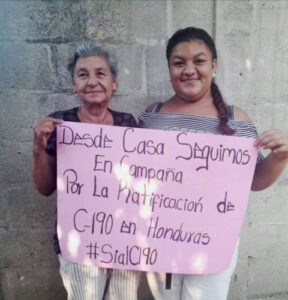
In Honduras, union activists are posting photos of themselves on social media with signs urging passage of C190. Credit: Promotoras Legales
In recommending steps to address violations of women’s rights to freedom of peaceful assembly and association, the report emphasizes the actions “should be grounded in supporting and empowering women’s movements and organizations in all their diversity.”
Governments must ensure adherence to international treaties addressing women’s right to a voice at work and in their communities, Voule said, speaking on a panel today with Solidarity Center Executive Director Shawna Bader-Blau and other civil society leaders. Among its recommendations, the report urges governments ratify International Labor Organization (ILO) Convention 190, which covers gender-based violence and harassment at work, and ILO C189 which recognizes domestic workers’ right at work.
Employers also “have a direct responsibility to respect and protect women’s rights to freedom of peaceful assembly and of association, to act with due diligence to prevent the violations of such rights and to provide women with effective remedies for violations connected to their operations,” the report states.
“Celebrating Women in Civil Society and Activism” builds on the 2016 UN Special Rapporteur report on workers rights that found workers rights—and the freedom to form unions and freely assemble—are key to achieving human rights because without assembly and association rights, workers have little leverage to change the conditions that entrench poverty, fuel inequality and limit democracy.
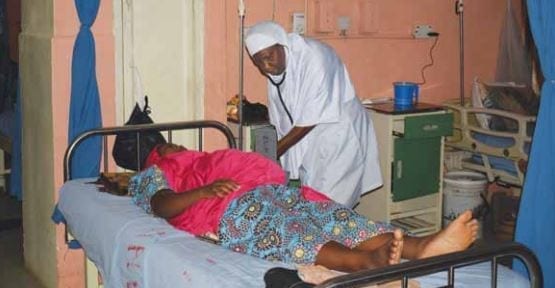
Oct 15, 2020
A new survey of 700 health workers in six West African countries—Gambia, Ghana, Nigeria, Senegal, Sierra Leone and Togo—provides a window into health-sector shortcomings that are compounding the region’s ability to respond effectively to the COVID-19 crisis. The survey, conducted by the Organization of Trade Unions of West Africa (OTUWA) together with national trade union centers and healthcare unions, was released last week together with a raft of union recommendations for ensuring the protection of health worker rights and effective, accessible healthcare for all.
“The results of OTUWA’s health care worker survey are very important for the decision-makers in this region, especially in the midst of a pandemic,” said OTUWA President and National Union of Autonomous Trade Unions of Senegal (UNSAS) General Secretary Mademba Sock.
The survey found that most health workers are being subjected to increased workload without additional compensation and feel unsafe at work due to shortages of personal protective equipment and inadequate access to COVID-19 tests. Respondents indicated insufficient health facilities, shortage of medical personnel and unaffordable medical care as their most pressing issues.
OTUWA, which represents trade union national centers in the 15 West African countries comprising the Economic Community of West African States (ECOWAS), will promote the survey’s findings and policy recommendations within regional organizations such as ECOWAS and the West African Health Organization (WAHO). OTUWA will also support affiliates as they engage their own governments on issues that negatively affect healthcare workers and prevent universal access to good health care.
“The survey findings underscore the fact that workers and unions must be involved in all discussions and decisions about health care systems in our region, so they properly serve everyone’s needs,” said OTUWA Secretary General John Odah, who is urging governments in the region to prioritize and increase budgetary spending on health facilities and supplies.
The survey report was released during an OTUWA-led virtual presentation on October 8, during which Kwasi Adu-Amankwah, International Trade Union Confederation (ITUC)-Africa general secretary, and David Dorkenoo, International Labor Organization (ILO) Bureau for Workers Activities (ACTRAV) specialist for Ghana, Liberia and Sierra Leone, underlined the survey’s importance for policymakers. Other participating organizations in the event included the Organization of African Trade Union Unity (OATUU); Benin, Gambia, Ghana, Mali, Nigeria and Senegal national union centers; and several healthcare unions.
“We are brothers and sisters across these countries, and we have learned a lot from the pandemic,” said West Africa Health Sector Unions’ Network (WAHSUN) Chair Perpetual Ofori-Ampofo, during the event.
At Ofori-Ampofo’s suggestion, event participants agreed that union representatives discussing healthcare issues with their governments should emphasize the urgency of ratifying International Labor Organization (ILO) Convention 190. C190 is the world’s first treaty requiring governments to address gender-based violence and harassment in the world of work, which Ofori-Ampofo said is commonly reported by health workers in the region.
The survey is an activity of OTUWA’s new “Healthcare Is a Human Right” campaign. Launched in Abuja in March, the campaign unites OTUWA affiliates in a fight for equal and fair healthcare access for all who live within the ECOWAS region.
The survey report is also available in French.
Oct 13, 2020
“Fashion’s unpaid bills have been catastrophic for garment workers. A September report co-written by the European Center for Constitutional and Human Rights, the WRC and the Solidarity Center’s ILAW network showed that these debts have led to mass layoffs (at least 1 million garment workers in Bangladesh, 150,000 in Cambodia), while the Clean Clothes Campaign found that millions of workers remain unpaid for the work they did at the beginning of the pandemic.”

Oct 8, 2020
Delivery employees in Colombia who work for the online platform Rappi joined protests across Latin America today calling for decent wages, job safety and health protections for gig economy workers. Largely migrant workers from Venezuela, they provide essential services delivering food from restaurants and grocery stores to homes, including during the COVID-19 lockdowns.
The Rappi workers began to organize in response to fluctuating pay rates for individual delivery jobs, unexplained fines levied by the company, and the arbitrary barring of workers from the platform to accept jobs. Workers are seeking to unionize to address these issues and collectively defend their labor rights. Some 81 percent say their only source of income is by working for Rappi.
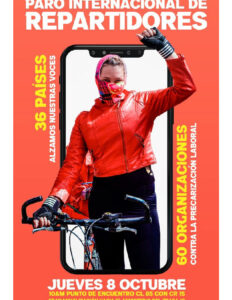 Riding motorcycles and bikes through Bogotá, Medellín, Pereira, Cali, Barranquilla, Bucaramanga and Cartagena, the workers culminated their protest at the offices of the Labor Ministry in each city, where they presented a petition to form a union, Union of Platform Workers (UNIDAPP), to secure their fundamental rights on the job.
Riding motorcycles and bikes through Bogotá, Medellín, Pereira, Cali, Barranquilla, Bucaramanga and Cartagena, the workers culminated their protest at the offices of the Labor Ministry in each city, where they presented a petition to form a union, Union of Platform Workers (UNIDAPP), to secure their fundamental rights on the job.
“These platforms derive their profits from the exploitation of hundreds of thousands of men and women around the world who work without rest or protection. for miserable income,” UNIDAPP said in a statement today. “We are workers without rights who go out to the streets day by day to meet the primary needs of this society.”
Even as workers at Rappi struggle to support themselves, Rappi last month raised more than $300 million in a new round of investment involving international funds, such as T. Rowe Price Associates. Rappi operates in nine countries in Latin America. On Mother’s Day in May, more than 4 million Colombians used the Rappi app, as delivery services benefited from increased demand due to social distancing and lockdown restrictions.
Of the 50,000 Rappi workers, almost none are covered by the nation’s safety and health laws, according to a 2019 study, which found that 63.2 percent had suffered work-related accidents and 67 percent contracted occupational diseases in the past two years. At least three workers at Rappi were killed on the job so far in 2020, two from traffic accidents and one during an attempted robbery.
Like gig workers around the world who struggle with low pay, dangerous working conditions and arbitrary treatment, Rappi employees seek passage of laws protecting their rights on the job and labor contracts to ensure those rights are enforced.
Although several bills are now in the Colombian Parliament to regulate digital platforms and require gig economy corporations to provide some basic workplace protections, UNIDAPP rejects the efforts because they were not drafted with worker input and fall far short of the basic protections they need.
The National Movement of Digital Platform Workers (MNRPD) is filing suit on behalf of the workers, seeking recognition of labor contracts that ensure labor rights. The SC collaborates with the MNRPD and provides technical and legal assistance to reinforce the union organizing effort.
UNIDAPP is an affiliate of the Central Workers’ Union (CUT), which heralded the new union, saying “we have a duty to fight for what we want, full workers’ rights, decent conditions of employment and social protection.”
“Today, a new stage begins for platform workers in the country,” UNIDAPP stated. “We are a strong trade union organization ready to bring our demands to all judicial, legal and administrative bodies, until we have labor rights!”
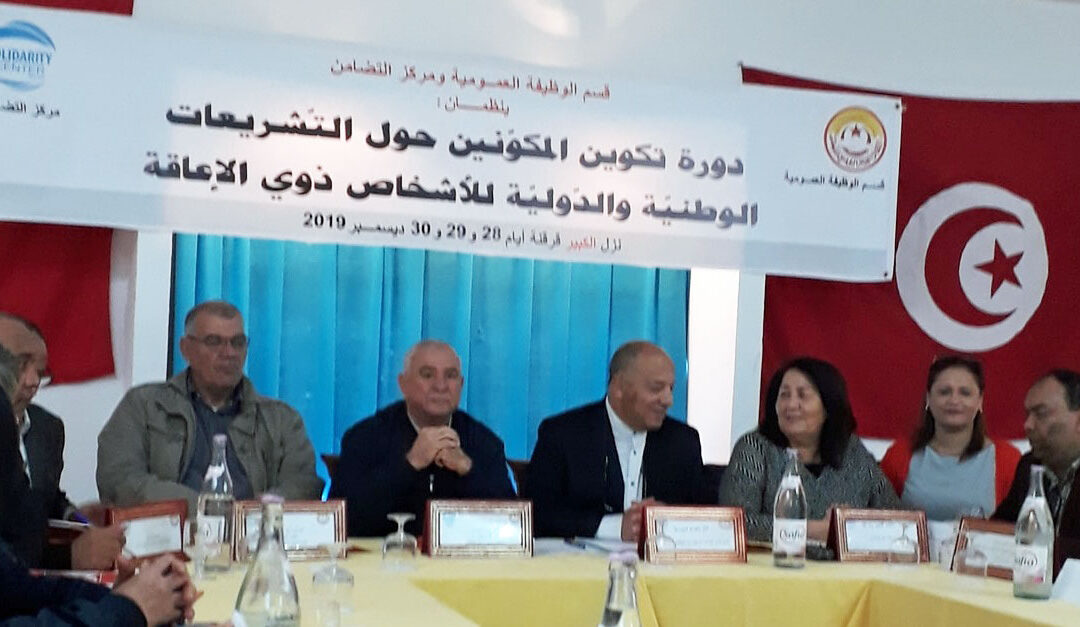
Sep 30, 2020
When the Tunisian Parliament this summer approved a law increasing the percentage of people with disabilities in civil service, union activists and their allies in the disability rights and human rights movements took a moment to celebrate the victory—and to reflect on the five-year advocacy campaign it took to achieve this goal.
“By paying attention to the issues of people with disabilities, working on more information and support for them, and considering their rights an integral part of the human rights system, people with disabilities are able to make valuable contributions to their communities if opportunities are available to them,” the Tunisian General Labor Union (UGTT) said in a statement.
The new law stipulates that no fewer than 5 percent of annual public service assignments for workers with a college degree who have been unemployed for 10 years are allocated to differently abled workers.
Unions, Civil Society Coalition Key to Success
A broad-based partnership with key disability rights activists fueled the campaign’s success. With Solidarity Center support, a 10-member leadership committee of differently abled workers from the UGTT and the Arab Forum for Persons with Disabilities, and a prominent civil society activist steered the project. The committee, half of whom were women, conducted train-the-trainer sessions with union leaders and representatives of organizations focused on the economic and social integration of workers with disabilities who, in turn, held similar trainings across the country.
“The rights of persons with disabilities are an integral part of the human rights system,” says Moanem Amira, assistant secretary general in charge of civil service unions, and coalition partner. Universal Human Rights frameworks, such as the United Nations’ Convention on the Rights of Persons with Disabilities, establish the right of those with disabilities to decent work without discrimination or exclusion.
Building on internationally guaranteed rights, the coalition strategized with workshop participants around the country on crafting campaigns for passage of national legislation. The coalition organized awareness days, including those that focused on the role of unions in reaching workers with disabilities, and mobilized them to achieve their economic and social rights. Workers and rights activists went on to champion the socio-professional inclusion of individuals with disabilities in the workplace and connect with government representatives to monitor and follow up on violations against workers with disabilities.
Dozens of workers with disabilities joined unions throughout the campaign through the outreach of activists such as Nabil Moumni. From his home in Gabes, in southeastern Tunisia, Moumni interviewed workers with disabilities in the public and private sectors to better understand their working conditions, held trainings and shared with workers the benefits of forming unions to achieve their rights.
A disability rights activist since 2012, Moumni says his involvement in the project and the hard work of those involved inspired him “to be a more enthusiastic as an activist.
“Everyone who took part in this project did their very best to reach important outcomes, because now awareness of human rights among trade unionists has reached a stage of maturity that makes the UGTT a locomotive for advocating social issues in Tunisia,” he says.
Moving the Campaign Forward
One billion people, or 15 percent of the world’s population, experience some form of disability, with 80 percent to 90 percent of working age people with disabilities unemployed in developing countries.
Persons with disabilities are more likely to experience adverse socioeconomic outcomes than persons without disabilities, such as under education, a higher drop-out rate, lower levels of professional integration and higher poverty levels.
Early on in the campaign, the coalition conducted a first-of-its-kind survey to examine how workers with disabilities and unions can address discrimination and lack of accessibility for workers in Tunisia. The survey surfaced the immense obstacles workers with disabilities face in finding good jobs. In particular, women with disabilities are challenged by the double burden of sexism and ableism. Sexual harassment, violence and other forms of abuse mean job opportunities can be both scarce and exploitative.
So even while celebrating passage of the new law, coalition members say they are planning to continue working to ensure workers with disabilities can exercise their rights—and already are organizing awareness-raising and advocacy campaigns and building a regional network to support workers with disabilities who can take part in improving their rights at work and in their communities.








 Riding motorcycles and bikes through Bogotá, Medellín, Pereira, Cali, Barranquilla, Bucaramanga and Cartagena, the workers culminated their protest at the offices of the Labor Ministry in each city, where they presented a petition to form a union, Union of Platform Workers (UNIDAPP), to secure their fundamental rights on the job.
Riding motorcycles and bikes through Bogotá, Medellín, Pereira, Cali, Barranquilla, Bucaramanga and Cartagena, the workers culminated their protest at the offices of the Labor Ministry in each city, where they presented a petition to form a union, Union of Platform Workers (UNIDAPP), to secure their fundamental rights on the job.